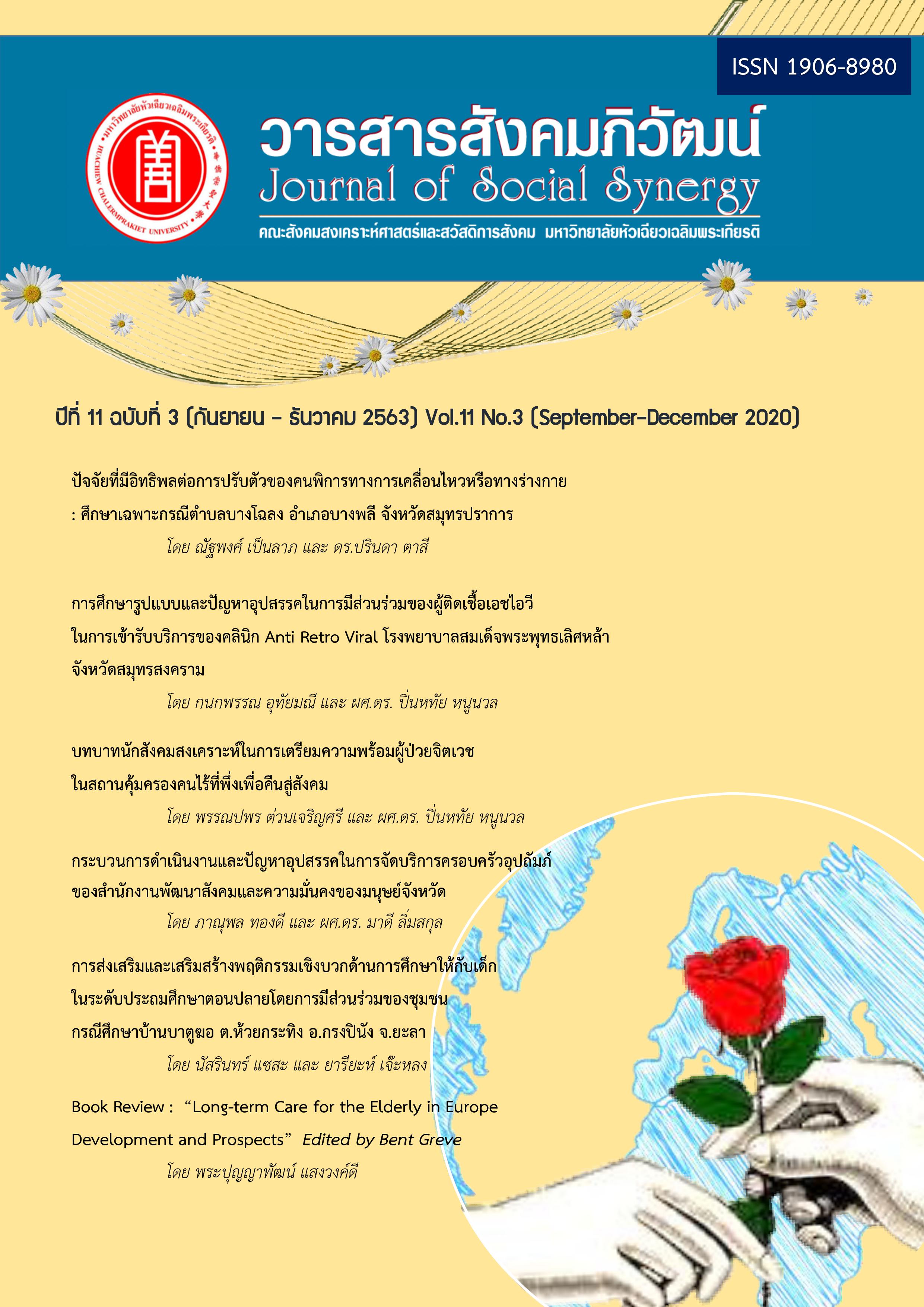Operational processes and problems and obstacles in foster care service of the Provincial Social Development and Human Security Offices
Keywords:
Foster care, Foster care service, Operational process of foster care service, Problems and obstacles in the operational process of foster care serviceAbstract
The objectives of this study were to study the opinions on the operational processes of foster care service of the Provincial Social Development and Human Security Offices and to study the opinions on the problems and obstacles encountered in the operational processes of the foster care service of the Provincial Social Development and Human Security Offices. This study was a quantitative research. The data was collected using questionnaires as a research tool from a total of 228 people, consisting of 3 groups: (1) social workers, (2) chiefs of social development and welfare groups and (3) staff of the Provincial Social Development and Human Security Offices in 76 provinces. The statistics used in the data analysis consisted of percentage, frequency, mean, standard deviation, t-test, one-way ANOVA, pairwise comparison and Scheffe’s test.
The results showed that the majority of the sample were female, age between 36-51 years with master degree. They were social workers with 4 or more years of experience in social work and 2-4 years of experience in the foster care service. As for the opinions on the operational processes of the foster care services of the Provincial Social Development and Human Security Offices, it was found that the staff complied with the operational processes of foster care service at a highest level. The operational processes consisted of 9 steps: Step 1 Staff training and preparation, Step 2 Expressing intention to become a foster family, Step 3 Application/evidence review/preliminary interview, Step 4 Home visit for monitoring the living condition, Step 5 Approval of a foster family, Step 6 Sending the written notice of the approval results to the applicant, Step 7 Monitoring of foster care, Step 8 Child foster care report and Step 9 Termination of foster care. According to the hypothesis testing, there were significant difference in age, position, experience in social work and experience in the foster care service between the Provincial Social Development and Human Security Offices at a level of 0.05.
As for the opinions on the problems and obstacles in the operational processes of foster care service of the Provincial Social Development and Human Security Offices, the staff indicated the middle level of the problems and obstacles, consisting of people, funding, materials and equipment, and management. According to the hypothesis testing, difference in age, education, position, experience in social work and experience in the foster care service were significantly related to the problems and obstacles encountered in the operational processes of foster care service of the Provincial Social Development and Human Security Offices at a level of 0.05.
Suggestions: (1) the policy on rates and criteria for the child foster care subsidy should be adjusted as needed and in line with economic conditions, (2) the central authorities should consider allocating sufficient budgets to the target groups, (3) there should be the training programs for different type of workers and the manual for foster care service should also be designed in accordance with the regional context, (4) the focus should be on reducing the number of children and youth in the public foster homes by increasing the proportion of the target group through the use of empirical evidence, and (5) regional authorities should review and plan the adequate manpower for their operations, as well as (6) promote and encourage the cooperation with local networks.
References
กรมกิจการเด็กและเยาวชน. (2561). คู่มือการดำเนินงานครอบครัวอุปถัมภ์. กรุงเทพฯ : กลุ่มงานครอบครัวอุปถัมภ์, ศูนย์อำนวยการรับเด็กเป็นบุตรบุญธรรม กรมกิจการเด็กและเยาวชน.
พนัส หันนาคินทร์. (2544). หลักการบริหารการโรงเรียน. กรุงเทพฯ : วัฒนาพานิช.
พัชชา เจิงกลิ่นจันทร์. (2556). กระบวนการปรับตัวและการอบรมเลี้ยงดูบุตรของแม่วัยรุ่นที่ต้องดูแลบุตรเพียงลำพัง : กรณีศึกษาผู้ใช้บริการของสหทัยมูลนิธิ. (วิทยานิพนธ์ปริญญามหาบัณฑิต). กรุงเทพฯ : มหาวิทยาลัยศรีนครินทรวิโรฒ.
มยุรี ยกตรี. (2544). ผลสัมฤทธิ์ของการจ้างเอกชนเลี้ยงดูเด็ก: กรณีศึกษาสถานสงเคราะห์เด็กบ้านเวียงพิงค์.(วิทยานิพนธ์ปริญญามหาบัณฑิต). เชียงใหม่ : มหาวิทยาลัยแม่โจ้.
ระเบียบกรมประชาสงเคราะห์ว่าด้วยการสงเคราะห์เด็กแบบครอบครัวอุปถัมภ์ พ.ศ. 2544. (2544, 27 พฤศจิกายน)ประกาศคณะปฏิวัติ. ฉบับที่ 294.
วนิดา บุญปก. (2558). การติดตามผลการเลี้ยงดูเด็กให้เป็นไปตามมาตรฐานการเลี้ยงดูเด็กขั้นต่ำของครอบครัวอุปถัมภ์ กรณีศึกษา สำนักงานพัฒนาสังคมและความมั่นคงของมนุษย์จังหวัดบุรีรัมย์. (วิทยานิพนธ์ปริญญามหาบัณฑิต). กรุงเทพฯ : มหาวิทยาลัยธรรมศาสตร์.
องค์การยูนิเซฟแห่งประเทศไทย และกระทรวงการพัฒนาสังคมและความมั่นคงของมนุษย์. (2557). การศึกษาทบทวนด้านการเลี้ยงดูทดแทนในประเทศไทย : นโยบายสู่การปฏิบัติโดยมุ่งเน้นเด็กที่ได้รับผลกระทบจาก
เอชไอวี/เอดส์. เอกสารอัดสำเนา.
Downloads
Published
How to Cite
Issue
Section
License
บทความที่ได้รับการตีพิมพ์เป็นลิขสิทธิ์ของวารสารสังคมภิวัฒน์ มหาวิทยาลัยหัวเฉียวเฉลิมพระเกียรติ
ข้อความที่ปรากฏในบทความแต่ละเรื่องในวารสารวิชาการเล่มนี้เป็นความคิดเห็นส่วนตัวของผู้เขียนแต่ละท่านไม่เกี่ยวข้องกับมหาวิทยาลัยหัวเฉียวเฉลิมพระเกียรติ และคณาจารย์ท่านอื่นๆในมหาวิทยาลัยฯ แต่อย่างใด ความรับผิดชอบองค์ประกอบทั้งหมดของบทความแต่ละเรื่องเป็นของผู้เขียนแต่ละท่าน หากมีความผิดพลาดใดๆ ผู้เขียนแต่ละท่านจะรับผิดชอบบทความของตนเองแต่ผู้เดียว




